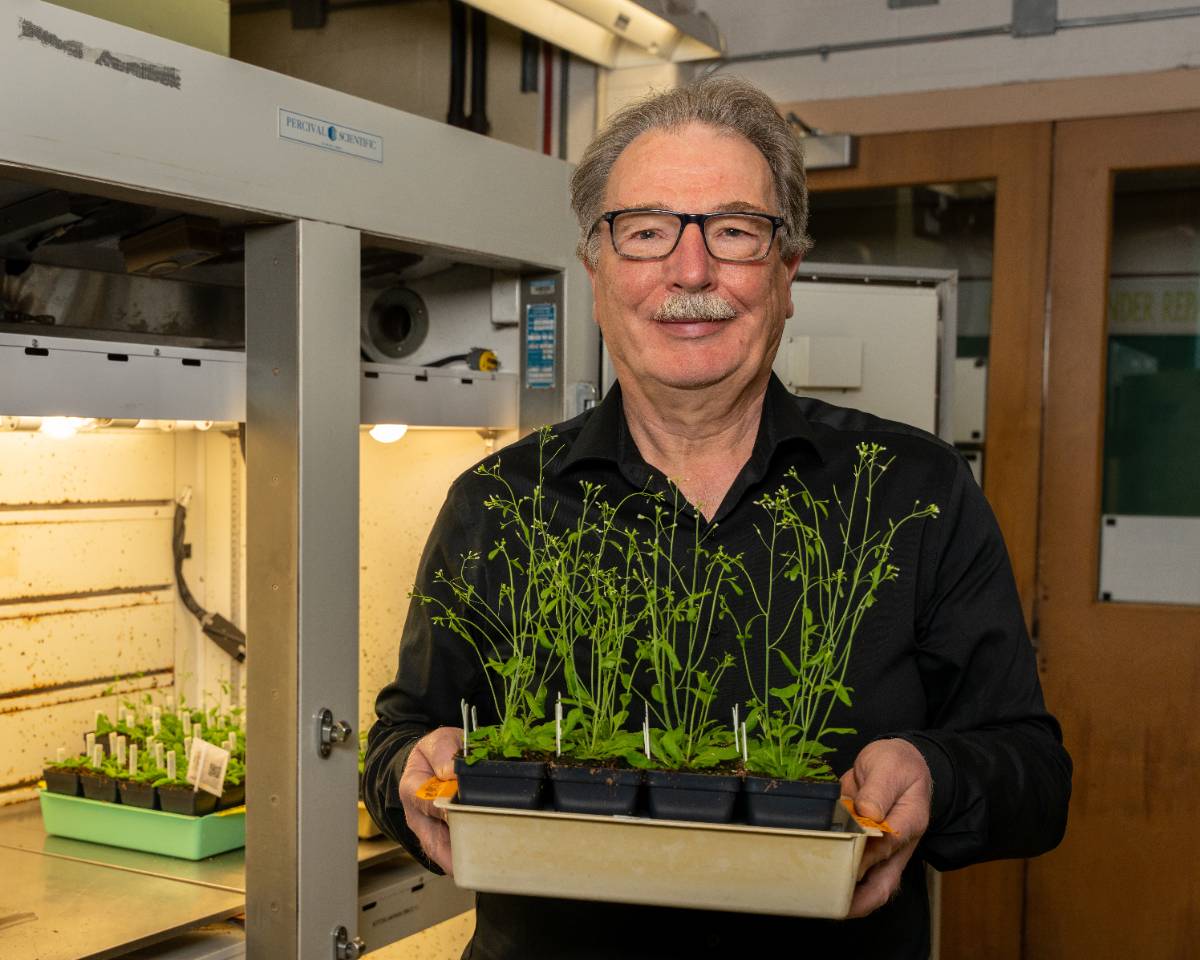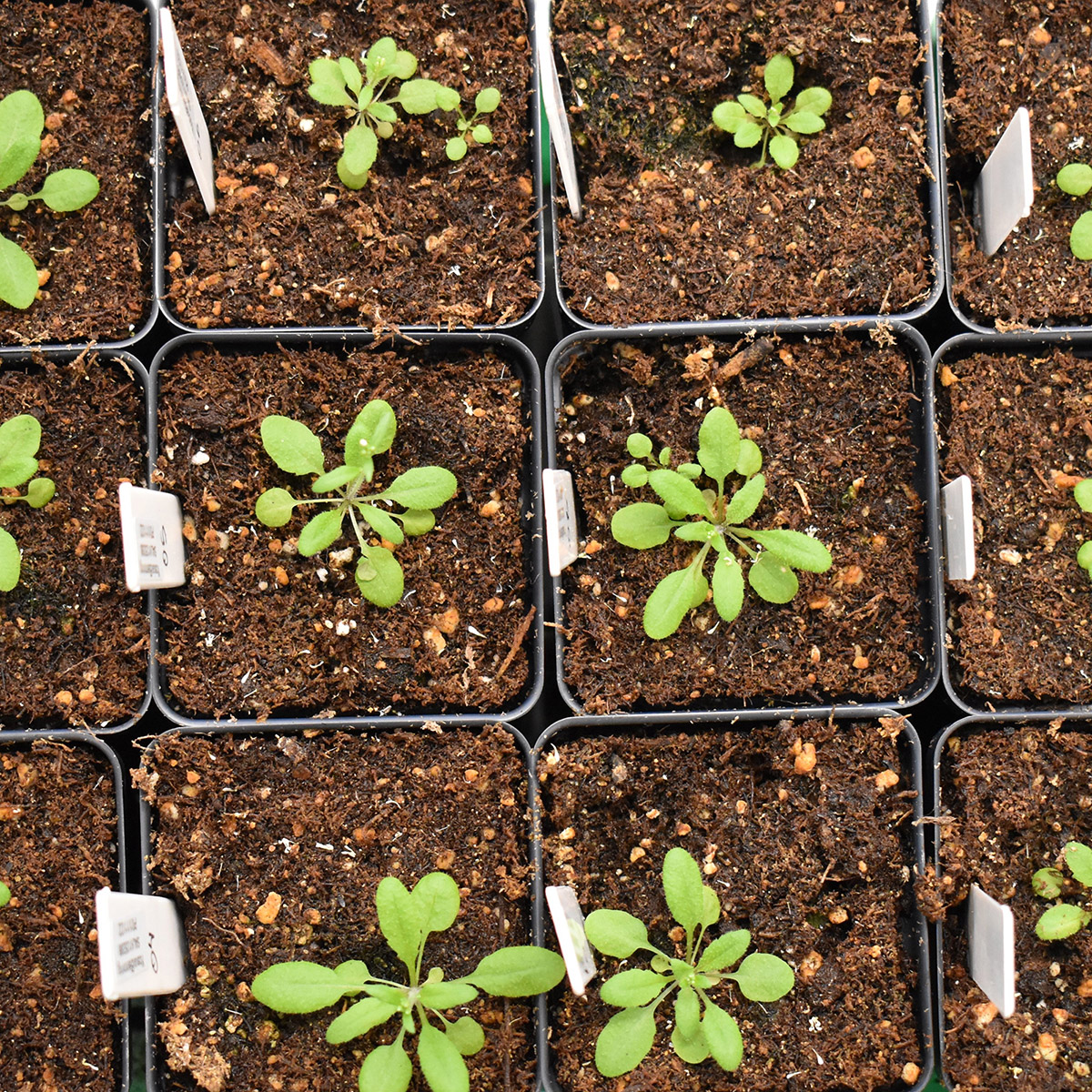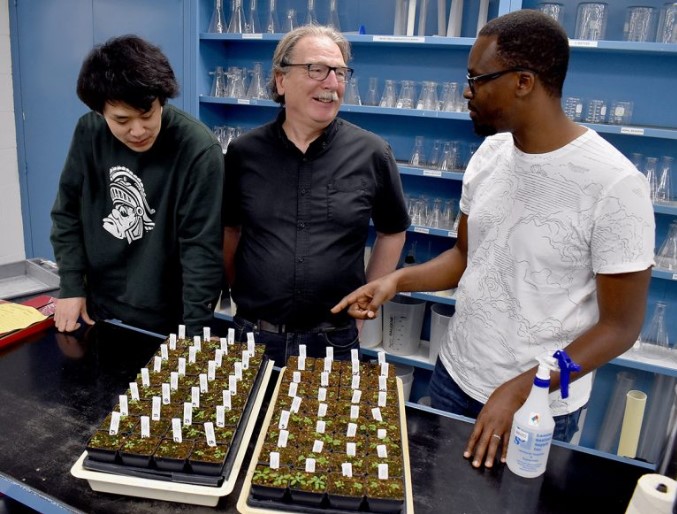Christoph Benning elected to National Academy of Sciences

Research in the Benning laboratory focuses on lipid metabolism in photosynthetic organisms. Credit: Paul Henderson
Christoph Benning, Michigan State University researcher, inventor and one of the world's foremost experts in plant lipid metabolism, has been elected to the National Academy of Sciences.
This achievement is one of the highest honors a scientist can achieve in the United States. Election is based on distinguished scientific achievements over the course of a person’s career. This year, Benning joins a select group of 120 members and 30 international members elected to the National Academy of Sciences, or NAS.
“I have long admired fundamental research like that done in the Benning lab — and how it is driven by curiosity to answer big questions about the world,” said MSU President Kevin M. Guskiewicz, Ph.D. “We all stand to benefit from Dr. Benning’s critically important research. It holds the key to feeding the world amid a changing climate by allowing researchers to create crops with better yields or higher rates of survival.”
Benning is the director of the MSU-Department of Energy Plant Research Laboratory, a position he has held since 2015. He is a University Distinguished Professor and MSU Research Foundation Professor in the Departments of Biochemistry & Molecular Biology and Plant Biology.
Spanning 40 years, Benning’s career has ranged from discovering genes and what they do, to finding ways for growers to produce more of the vegetable oils we rely on for cooking and biofuel.
During his career, Benning studied storage and membrane lipid metabolism in photosynthetic organisms, such as plants, algae and bacteria. His work has uncovered several genes and their functions in the model organism, Arabidopsis thaliana.
“I am truly honored for being elected by my peers to the National Academy of Sciences,” Benning said. “This would not have been possible without the dedication and efforts of my mentees, mentors, collaborators, colleagues, and staff, and the support of my family and friends. I thank them all. Although there are too many to name everyone, I would like to mention John Ohlrogge, who recently passed away, and with whom I have had innumerable helpful conversations, personal and scientific, since I joined Michigan State University. I am particularly grateful to my spouse, Susanne Hoffmann-Benning, who accompanied me along the way and kept me humble. I am aware that becoming an Academy member comes with responsibilities, especially this year. I anticipate remaining fully engaged in support of the plant sciences community at Michigan State University and beyond for the greater good of all.”

A key research area for his lab is the assembly and maintenance of the photosynthetic membrane in chloroplasts, the compartment in plants where they convert sunlight and carbon dioxide into the cell’s building blocks and split water to release oxygen into atmosphere, a process which drives life on earth. Another interest area is membrane lipid remodeling and storage lipid accumulation in response to adverse conditions, such as freezing or nutrient deprivation. Understanding how plants respond to stressful conditions allows for researchers to create plants that are resilient to these environments. Currently, he focuses on chloroplast lipid-based signaling processes enabling plant resilience in a changing environment.
Among his notable accomplishments is the identification of the WRINKLED1 protein in Arabidopsis. This protein is a key transcription factor for the regulation of oil biosynthesis in naturally vegetable oil-containing tissues, seeds or fruits of all plants studied. Essentially, the transcription factor acts like a switch that can be flipped on and off, and when on, the plant will produce more vegetable oil.
Bringing the lab to the farm, engineering this switch has made way for the design of crops with an expanded capacity for making vegetable oil. The oil not only accumulates in seeds but also parts of the plant that it would normally not. Having more vegetable oil in the plant biomass has created a new source for biofuels and animal feed. In 2018, alongside John Ohlrogge, Benning was awarded the MSU Innovator of the Year Award for this work.
In addition to the Innovator of the Year Award, Benning has received numerous other accolades. He was the editor-in-chief of the Plant Journal from 2008 to 2016. In 2010, he received the Terry Galliard Medal at the International Symposium on Plant Lipids. He was recognized as a Highly Cited Researcher in 2019-2021 in the annual list compiled by Clarivate Analytics.
Benning was elected a Fellow of the American Association for the Advancement of Science in 2014. He became a senior member of the National Academy of Inventors in 2022, the first MSU researcher to do so.
“Christoph Benning has had a storied career with numerous important discoveries that led to well-deserved recognition,” College of Natural Science Dean Eric Hegg said. “His election to the National Academy of Science is a fitting tribute to his outstanding contributions and the culmination of an exemplary career in plant sciences. Throughout his career, he has also been a dedicated mentor, inviting younger faculty into his research and helping them achieve success. He has my heartfelt congratulations.”

- Categories: